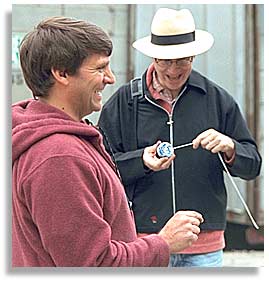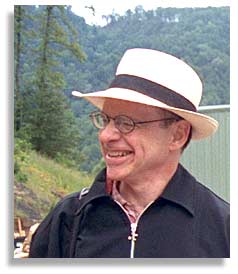|
An interview with John Malpede
A good survival strategy - Theater Part 2 - The extractive economy Interview by Nic Paget-Clarke
The following interview (part 2) with John Malpede is part of a series of interviews with some of the members of a group of 25 artists from around the U.S. and Canada who went to Kentucky and Virginia to participate in the initial stages of a multi-year, multi-site community art project sponsored by the American Festival Project. The American Festival Project is based in Whitesburg, Kentucky with Appalshop, a regional community arts center. Also see: Fred Campbell, Rodrigo Duarte Clark, Harrell Fletcher, Shannon Hummel, Stephanie Juno, Suzanne Lacy, Robbie McCauley, Nobuko Miyamoto. In Motion Magazine: What were you thinking you could bring to this gathering? John Malpede: I wasn’t looking at that way. Everyone who was asked to come here was someone who in some way had some experience making art in some kind of community setting with a social change thought in their mind while they were doing it. Then the question was - and I like the way it was an open question - whether there was something that would eventuate from this. It wasn’t like, come here and make a project. It was, come here and see if there is something you can do. In Motion Magazine: Since coming here, how have you been involved with the local community? John Malpede: We’ve been going out and talking to people. People have been taking us and talking to us. Some of the people have been really impassioned and given very strong political analyses of life here, which is great. And other people have been couching their analysis more in their bailiwick and being a little more circumspect about the overall motivation. Also, there have been a few forays into talking to whoever we ran into on the street. In Motion Magazine: Those are pretty different kinds of interactions. John Malpede: Yes. One thing that is interesting, in terms of the issues, is the extractive economy. The colonial nature of this area is really interesting. I was upstairs, earlier, to do the intro for the audio tape we made and while I was waiting another group was doing their tape. They had asked a bunch of people in a restaurant, “What is your favorite place around here? And “What is your dream?” Somebody’s dream was, “To have more stores in town, because most of downtown has shut down. We need a place where we can buy shoes.” I immediately thought about the situation on Skid Row in Los Angeles. Last week, I was busy writing a grant (laughs) and one of the things I said in it that was Skid Row is a neighborhood where you can’t buy a newspaper. There are no newspaper boxes in the Skid Row area of Los Angeles. It’s a place where you can’t buy anything. One thing that is going on there is different neighborhood groups are trying to build what they call a “more normative healthy neighborhood”. In other words, more levels of activity, including some level of retail businesses, even a restaurant, let alone a library. More human activity. When I heard this on the radio, I was surprised at the similarity of living in a place where basic things like that are not available. In Motion Magazine: You come from a big city, and here we are in a rural area. Do you see any concrete differences in the way art is treated or thought of ? Or that’s not a relevant distinction? John Malpede: I don’t have enough information at this point. Here, Appalshop is a major institution so people who are in the shadow of Appalshop probably have a much different notion about the place of art in the world than the people who live 100 miles away, further into the mountains. They’ve been exposed to a lot. Since I’ve been working within a couple of miles of Appalshop, everyone knows about it. It’s part of their lives. In Motion Magazine: What’s it like to have a process that has in it the option to go down to the local store to chat? John Malpede: I think that it is very good, in the course of a conversation, to have someone say, “This is a wonderful area but don’t come here looking for a job. There are no jobs here what you need is a check, or maybe two, or three.” That’s a totally savvy political comment which might easily, depending on who is hearing it, never register as a political comment at all. I think this conversation that I had was full of political stuff but you had to know a certain amount to hear it. It could be extended in ways that brought it out further. Talking to anybody, regardless of the point of view, is information. A playfulness in what he was talking about In Motion Magazine: How is the interplay going between the people who have come here and the people who live here? John Malpede: As far as I know it’s all positive. It’s good. It’s been activating for the local community who have been taking the lead. They are doing the talking for the most part. Not that we have to raise our hands. We are doing the finding out and they are the ones who know. Like Mike this morning, after we were talking for a while he seemed to think that maybe this meeting with these artists could be more important than he thought it might have been earlier in the morning. In Motion Magazine: Did he expound on that? John Malpede: I think he said that the artists could actually help in realizing some of the ideas that he had for the development of the recycling center. He was full of all kinds of ideas that had to do with art. Exhibit planning, architecture, design, science museums - all facets of creativity that do or don’t fall into something called art. I think he thought it could actually go somewhere. It was heartening. In Motion Magazine: Did you have a different opinion from the beginning to the end of the morning as to how what you were doing would relate to problem solving, community problem solving? John Malpede: Yes, it was heartening. Not necessarily with the things I’m good at, but in terms of his vision, there was actually different kinds of economic potential. They already make money on the recycling. From the economic view it would be prudent for the county to give him more support because he is making money recycling. It would save them on landfill. But, also, there is potential with the children’s museum, a science museum not limited to recycling. You could get corporate support. He wanted to do architectural design that would mirror the contours of the hill carved away. The building would literally fit into that niche. It was a vision that had a lot of different spokes going out from it. Even though it was visionary it had a lot of ways it could hook onto reality, and be viable. Plus it was fun. There was a playfulness in what he was talking about, all the way through. Fun and art. John Malpede: What’s interesting about Mike’s thing is that it’s located where art crosses with design and ecology and science and commerce and invention. They can’t even be sorted out.
This kind of art for sure. When it’s located at these intersections it’s hard to say what it is. Or what the motivation is. Where it’s coming from. What the person’s background or pedigree is -- is not necessarily the important fact. This is very similar to the work I’ve been doing in Los Angeles. From the beginning I was just following my nose. It was wired up with activism and lawyers and theater and welfare. It was a very weird stew. And now it’s wired up with community development and drug programs, and religion and activism. All these different kinds of things that can be read in different ways. Like that road you didn’t know which fork to take. It turned out both were the same road. Art is about inquiry. It’s about creativity, we know that, but creativity is not just art. It’s about thinking. Creativity goes out into anything. It’s in science, in carpentry. It’s in, whatever, cooking. Those fertile intersections are what is common. In Motion Magazine: So the process. Do you know what it is? How is it coming along? John Malpede: I have no idea what the process is but I think it’s coming along fine. In Motion Magazine: Is that a process? John Malpede: I’m happy to regard that as a process. As I said, I think they’ve done a good job of structuring the week and also making the mandate really open at the same time. At least that’s my understanding of the situation. In Motion Magazine: Have you ever done that in your work before? John Malpede: Oh yes. All the time. In Motion Magazine: You would do work and you would not know where you were going? John Malpede: It is a little different than what I do at home. But even when I’m working on a project by myself, as you are doing the project you are re-adjusting what the end is. You have some initial motivation, and you have something that you think is important. As you are pursuing it you keep re-adjusting that in light of what you are learning and what you are creating. It’s only at the very end when the two things become one. The goal and the realization. When you are making art then you have something that has it’s own independent existence. It’s no longer yours. It stands against you like a teenaged child. Here we are doing the same thing.
|
||||||||||||||||||||||||||||||
| Published in In Motion Magazine October 21, 2000 |
||||||||||||||||||||||||||||||
If you have any thoughts on this or would like to contribute to an ongoing discussion in the  What is New? || Affirmative Action || Art Changes || Autonomy: Chiapas - California || Community Images || Education Rights || E-mail, Opinions and Discussion || En español || Essays from Ireland || Global Eyes || Healthcare || Human Rights/Civil Rights || Piri Thomas || Photo of the Week || QA: Interviews || Region || Rural America || Search || Donate || To be notified of new articles || Survey || In Motion Magazine's Store || In Motion Magazine Staff || In Unity Book of Photos || Links Around The World NPC Productions Copyright © 1995-2020 NPC Productions as a compilation. All Rights Reserved. |
||||||||||||||||||||||||||||||



